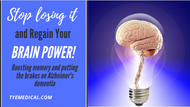Are You Losing It? How to Boost Memory Power and Prevent Dementia
Written by tyemedical on May 20th 2020
We’ve all forgotten where we laid our keys or the name of the girl who sat beside us in history class, but sometimes the failure to remember means something more – like we’re getting older! It’s not a pleasant reminder, but the plain truth is that our minds age along with our bodies. In fact, researchers believe regions of the brain actually shrink with age. So yes, sometimes you might think you’re “losing it” when your short-term memory leaves you wondering why you’re standing in front of an open refrigerator. (Been there!)
But did you realize you can grow new brain cells even as a senior adult? When you engage in learning and other complex mental activities, you’re growing gray matter! Mental stimulation triggers the formation of new connections in your brain and strengthens existing ones. You’re literally increasing brain power and memory capacity.
The truth is, we can’t completely outrun the natural effects of aging on our memory, but we can be proactivein slowing cognitive decline by keeping our brains busy!
So, let’s look at some memory boosting techniques and what you can do to put the brakes on more serious memory conditions like dementia.
Flexing Your Memory Muscles
To be clear – your brain is an organ, not a muscle, but you can give it a workout and increase memory capacity with a little disruption in your daily schedule. While routines are comforting and combat anxiety, they’re not doing you any cognitive favors. Your brain loves a good challenge and craves something different – something fresh. You don’t have to turn your world upside down, but it’s a good idea to add some new and unexpected challenges to your life in small ways.
The key to boosting memory power is to shake things up a little and add some variety and real-world activity to your life (rather than relying on virtual memory games).
6 Tips for Boosting Mental Activity and Memory
1. Discover a Foreign Language
You might not have had time for this at other points in your life, but now you have an important reason for learning French, Italian, or any other language that intrigues you. Whether you take an in-person class, use software, or sign up for an immersion experience, the process of listening, learning, and expanding vocabulary stimulates brain cell growth.
2. Embrace the Musician Within
Like learning a foreign language, learning to play a musical instrument also has a profound impact on stimulating brain cell growth and enhancing memory. It engages both sides of the brain and involves numerous cognitive processes.
But the benefits don’t end there. Even after you’ve learned the basic skills, you continue to increase brain function and memory power. In fact, those who have played a musical instrument throughout most of their lives have shown a lower risk of developing dementia. (But it’s never too late to enjoy the benefits.)
 3. Enroll in a Class that Interests You
3. Enroll in a Class that Interests You
You don’t have to choose something practical; you’re not trying to further your career (although you could). It’s more about finding something that interests you and learning more about it. Here are some ideas to inspire outside of music and foreign languages.
Are you the studious type? Have you always wished you had paid more attention during history class? Well, now is your time to turn that regret around. Try courses in:
- Creative writing
- Literature
- Health education
- Psychology
- Poetry
- History
While the social engagement offered through an n in-person class is also beneficial for enhancing memory, you’ll still reap rewards from an online class if that better suits you.
Are you more hands on?Need some fun or stress relief? Try some of these stimulating classes:
- Cooking
- Sketching or painting
- Pottery
- Woodworking
- Interior design
- Photography
 4. Engage in a New Sport or Fitness Activity
4. Engage in a New Sport or Fitness Activity
We’ll talk about physical activity and dementia in the following paragraphs, but it also plays an important role in both short and long-term memory. You don’t need an intense cardio workout to see great gains in memory power. In fact, researchers have found that even daily light activity increases memory formation and storage.
This is great news for seniors who aren’t up for running marathons or embarking on day hikes in the mountains. It’s as simple as adding some yoga, tai chi, golf, or a round of friendly tennis to your days. If you have mobility challenges, the Down Dog yoga app offers a chair yoga option.
The combination of learning something new and being physically active is a powerful combination for memory boosting.
5. Read Often
Reading still holds its place as one of the top ways to train your brain. When you read, you’re exercising both memory and vivid imagery. You’re also participating in a variety of new experiences and situations. Since reading is a complex, challenging brain activity, it builds brain cells and connections that keep your mind and memory sharp as you age. Writing has a similar affect on your memory power, so also consider keeping a journal or taking that creative writing class suggested above.
If you can’t get to a bookstore (they’re not easy to find these days), consider ordering books online or try downloading them to a tablet or e-reader (like Kindle). You can also visit your local library.
 6. Play Brain Games
6. Play Brain Games
Cognitive games challenge your brain and increase memory capacity but shouldn’t replace learning new skills or reading. They’re still critical for maintaining and growing your memory. So, think of sudoku, word games, and even comic strips (comparing different images and words) as memory support. When you have down time, these are great ways to challenge your mind and increase memory power. Just don’t rely solely on them for maintaining cognitive health.
For additional brain-training games see this article for from alzheimer’s.net.
Top 4 Ways to Stave Off Dementia and Alzheimer’s
Candidly speaking, no one can prevent these long-term cognitive diseases completely. Genetics, environmental considerations, and lifestyle factors all play a role in the likelihood of developing these illnesses. But even if you’re genetically predisposed to developing dementia or Alzheimer’s, you can still slow the decline and limit the severity by managing your lifestyle.
Interestingly, all the advice you hear about healthy living, like staying active and eating a nutritious diet, play an important role in protecting your memory and cognitive abilities. So aside from stimulating mental activity, here are some other things you can do:
1. Stay Active
As it relates to Alzheimer’s and dementia, the jury is still out on the impact of physical activity. However, several studies have shown that people who exercise have a lower risk of cognitive decline than those who don’t. Scientists found fewer Alzheimer’s plaques and tangles in the brains of people who exercise. They also performed better on certain cognitive tests. More research is needed to determine a direct link between physical activity and Alzheimer’s/dementia.
On the other hand, many doctors and scientists believe exercise is one of the top ways to preserve memory and mental function as you age. In fact, some studies show that it doesn’t take much. As mentioned above, short periods of light-intensity exercise, like slow walking, yoga, or tai chi, can improve the function of the hippocampus, which is part of the brain responsible for memory. (Higher intensity workouts also offer tremendous memory boosting benefits, but more intense exercise isn’t practical for many seniors.) These findings reveal great potential for a more direct link between light exercise and Alzheimer’s/dementia.
If you feel like you can’t do enough to make a difference, think again. If you can slow walk for 5-10 minutes (and your doctor approves), then do it! Every step boosts memory, cognitive function, and might even slow the onset of more serious cognitive decline.
 2. Eat a Plant-Based Diet
2. Eat a Plant-Based Diet
This doesn’t mean no meat at all but instead suggests that mostof your diet should consist of vegetables, fruits, whole grains, and plant-based protein. You can also include moderate portions of fish and skinless poultry, but reserve red meat for rare occasions. For more information about a plant-based diet, refer to our article, How to Prevent Cancer: Latest Research Is Shockingly Simple
You might be wondering, “Why am I seeing ‘plant-based diet’ everywhere – even on this blog? It’s because this type of eating prevents a host of health conditions and eases many symptoms. And since the latest research suggests that following a plant-based (or Mediterranean diet,anti-inflammatory diet) might slow cognitive decline and the risk for Alzheimer’s dementia, we think it’s worth mentioning again.
So, how does it help?
Researchers aren’t exactly sure, but they’re several possibilities. The most likely and impactful reason being that a Mediterranean or similar plant-based diet increases certain nutrients with anti-inflammatory and antioxidant properties that protect the brain. So, you’re literally eating for brain health – no kidding. Scientists are also considering other ways in which nutrition-packed diets low in animal products protect against Alzheimer’s.
3. Manage High Blood Pressure
During middle age, many people still haven’t quite accepted the fact that they’re not invincible. The doctor diagnoses them with high blood pressure, and they might not take it very seriously. Whether you are middle age or a senior, controlling high blood pressure should be top priority, even for brain health and memory protection.
Here’s why.
According to the National Institute on Aging, many studies suggest there’s a link between high blood pressure, cerebrovascular disease (a disease of the blood vessels supplying the brain), and dementia. Researchers discovered this connection after finding that people with Alzheimer’s also show signs of vascular damage in the brain. This is likely due to narrowed or blocked arteries (caused by chronic high blood pressure) that limit blood flow to the brain, which is called vascular dementia.
What does this mean for you?If you have high blood pressure, be sure it’s controlled. Stay faithful to your doctor’s orders and don’t brush it off if you notice more than an occasional spike. Remember that managing your condition will also help prevent vascular damage to your brain and help slow or prevent related Alzheimer’s dementia.
4. Get Good Sleep
You probably saw this one coming. Scientists have long known that we consolidate our memories as we sleep, like defragging a hard drive. When we get good rest, our brains go to work deleting useless information, saving important thoughts for recall, and then sorting other data for long-term storage. It’s quite amazing when you think about it.
But if you’re not getting the quality sleep you need, this process is disrupted. Long term, your cognitive abilities are affected and memory power shrinks. Additionally, researchers have discovered that disrupted slow wave sleep (deep sleep) contributes to brain atrophy that leads to dementia. So, if you suspect you have sleep apnea or another sleep disorder, it’s important to talk to your doctor about how to diagnose and resolve your sleeping issues.
Summing It Up
Whether it’s heart health, cancer prevention, or brain health, the most important thing you can do is take care of yourself. Be as active as you can, eat a nutritious diet, manage your health conditions, challenge your mind, and get good rest. Wellness is a whole-body approach. What’s good for brain health is good for heart health – and vice versa. These foundational steps can help improve your memory and might even prevent or slow Alzheimer’s dementia.
The Link Between Dementia and Incontinence
Incontinence isn’t typically what comes to mind when you think of dementia symptoms. However, about 60-70% of people with Alzheimer’s develop incontinence, typically in the later stages. Simple reasons for this are related to urinary tract infections, constipation, prostrate issues in men, and some medications.
But sometimes it’s due to the cognitive decline associated with dementia. People with this condition might not recognize the sensation that tells them they need a bathroom (problem with brain-to-bladder messaging), or they might become confused and not know how to find or even use the toilet.
As a caregiver, it’s important that your patient or loved one follows up with a doctor to determine the cause of incontinence symptoms. Meanwhile, it’s best for everyone involved if you have quality, dependable incontinence products on hand.
Our LivDry products include comfortable Protective Underwear with Leakage Barrier Cuffs and a Super Absorbent Gel Core to keep your loved one dry (while making your life a little easier).
LivDry Protective Underwear is also made to use with our disposable shaped pads for added protection and cost savings.
Visit our online store for discreet shipping that’sfreewith a purchase over $20.


